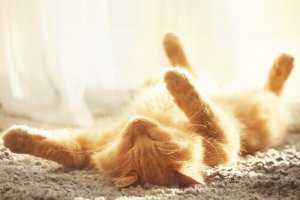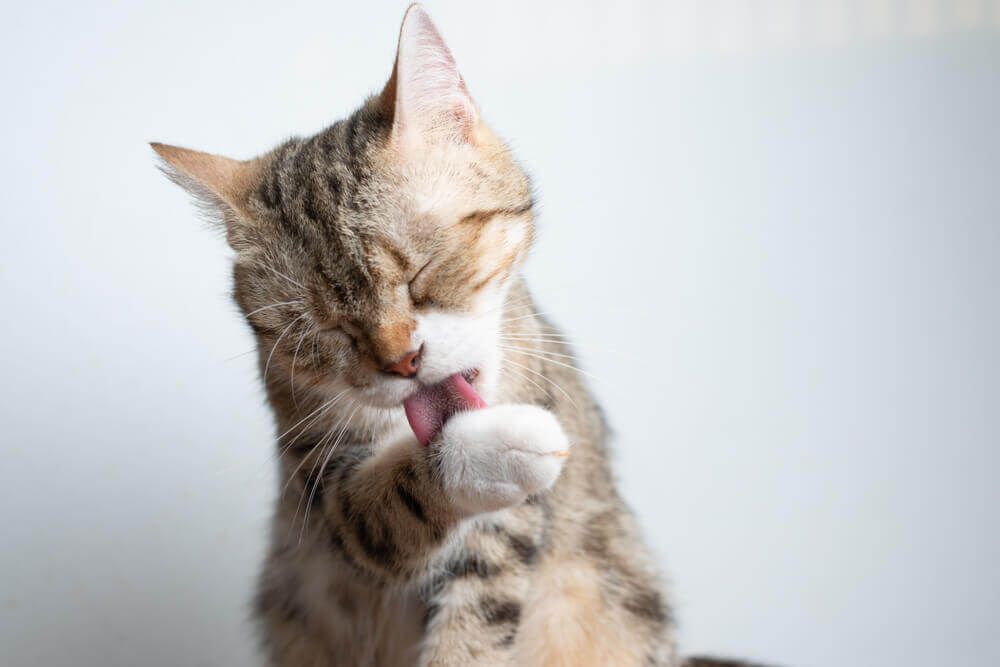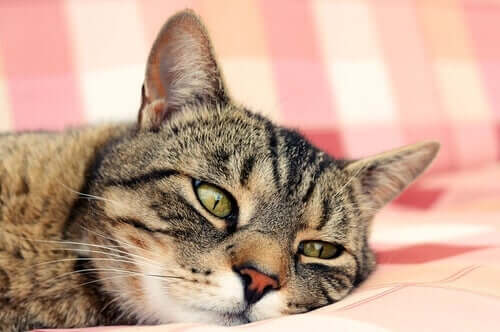How to Know If Your Cat Is Cool in Summer

Humans can adapt to temperature changes either through physiological changes or by changes in their behavior. In summer, we sweat, drink more, and look to keep in the shade. Cats do just the same. If you want to be sure that your cat is cool in summer, just observe their behavior and help them if you’re worried that they might be too hot.
How do cats regulate their body temperature?
Cats don’t sweat like we do. Their sweat glands are located on the pads of their paws, so this is the only place that they sweat.
However, they can also stay cool by keeping their mouths open, just like dogs. But excessive panting can be a sign of stress or that something isn’t quite right. So, if you see your cat panting in an alarming way, it’s best to go straight to the vet.
When they groom themselves, they don’t just untangle their fur and remove dead hair; they also spread saliva over their body, which slightly reduces their body temperature.

Heatstroke in cats
In some parts of the world, summer temperatures can get very high, which can lead to heatstroke in both people and animals. The most vulnerable cats are kittens and sick or older cats.
Hyperthermia, or heat stroke, happens when the body’s ability to remove heat is not fast enough to maintain a stable body temperature. Heatstroke can be very dangerous and even fatal. To avoid it, it’s important to pay attention to any of the following signs:
- Accelerated breathing or difficulty breathing –their mucosa may change color
- Increased heart rate
- Muscle tremors or vomiting
- Red spots on the skin
- Weakness
If you detect any of these symptoms, you need to get your cat away from the source of heat, and if it’s really severe, they may need medical attention. A common cause of heatstroke is being locked in a vehicle in direct sunlight.

How to know if your cat is cool in summer
A lot of domestic cats aren’t allowed outside, so obviously these cats have little trouble keeping cool. However, if they do seem to be a bit hot, you can offer them some wet food to help hydrate them. You can also brush them daily to avoid a build-up of dead hair which stops air from getting to the skin.
Keep them in the shade or a cool place
Cats like to hide, so if they have a cool shelter somewhere out of the sun, they’ll be bound to use it during the summer.
The right house temperature
You can keep your house temperature down by using fans or air conditioning. But be careful not to set the temperature too low because sudden changes in temperature can be bad for both you and your cat. If it’s enough just to open the windows, just make sure that your cat can’t fall out and hurt themselves.
Make sure they always have water available
In summer, it’s really important that both people and animals stay hydrated. Cats are a bit fussy about water and always prefer moving, circulating water that’s clean and fresh. This is why it’s so common to see cats drinking from the tap! Of course, you can still put out a bowl of cool water, as long as you change it every day. You can even buy special water fountains for cats.

Avoiding movement in the hottest hours of the day
In high temperatures, cats are usually more inactive so as to avoid generating more body heat. Cats are nocturnal as well so they tend to be more active at dawn and dusk. It also happens to be a much cooler part of the day.
Humans can adapt to temperature changes either through physiological changes or by changes in their behavior. In summer, we sweat, drink more, and look to keep in the shade. Cats do just the same. If you want to be sure that your cat is cool in summer, just observe their behavior and help them if you’re worried that they might be too hot.
How do cats regulate their body temperature?
Cats don’t sweat like we do. Their sweat glands are located on the pads of their paws, so this is the only place that they sweat.
However, they can also stay cool by keeping their mouths open, just like dogs. But excessive panting can be a sign of stress or that something isn’t quite right. So, if you see your cat panting in an alarming way, it’s best to go straight to the vet.
When they groom themselves, they don’t just untangle their fur and remove dead hair; they also spread saliva over their body, which slightly reduces their body temperature.

Heatstroke in cats
In some parts of the world, summer temperatures can get very high, which can lead to heatstroke in both people and animals. The most vulnerable cats are kittens and sick or older cats.
Hyperthermia, or heat stroke, happens when the body’s ability to remove heat is not fast enough to maintain a stable body temperature. Heatstroke can be very dangerous and even fatal. To avoid it, it’s important to pay attention to any of the following signs:
- Accelerated breathing or difficulty breathing –their mucosa may change color
- Increased heart rate
- Muscle tremors or vomiting
- Red spots on the skin
- Weakness
If you detect any of these symptoms, you need to get your cat away from the source of heat, and if it’s really severe, they may need medical attention. A common cause of heatstroke is being locked in a vehicle in direct sunlight.

How to know if your cat is cool in summer
A lot of domestic cats aren’t allowed outside, so obviously these cats have little trouble keeping cool. However, if they do seem to be a bit hot, you can offer them some wet food to help hydrate them. You can also brush them daily to avoid a build-up of dead hair which stops air from getting to the skin.
Keep them in the shade or a cool place
Cats like to hide, so if they have a cool shelter somewhere out of the sun, they’ll be bound to use it during the summer.
The right house temperature
You can keep your house temperature down by using fans or air conditioning. But be careful not to set the temperature too low because sudden changes in temperature can be bad for both you and your cat. If it’s enough just to open the windows, just make sure that your cat can’t fall out and hurt themselves.
Make sure they always have water available
In summer, it’s really important that both people and animals stay hydrated. Cats are a bit fussy about water and always prefer moving, circulating water that’s clean and fresh. This is why it’s so common to see cats drinking from the tap! Of course, you can still put out a bowl of cool water, as long as you change it every day. You can even buy special water fountains for cats.

Avoiding movement in the hottest hours of the day
In high temperatures, cats are usually more inactive so as to avoid generating more body heat. Cats are nocturnal as well so they tend to be more active at dawn and dusk. It also happens to be a much cooler part of the day.
All cited sources were thoroughly reviewed by our team to ensure their quality, reliability, currency, and validity. The bibliography of this article was considered reliable and of academic or scientific accuracy.
- Nutro. Cómo prevenir y tratar el golpe de calor en gatos.
- Cathealth.com
- Pet MD. How Do Cats Sweat?
- Portal veterinaria. Fisiopatología y tratamiento de las hipertermias.
This text is provided for informational purposes only and does not replace consultation with a professional. If in doubt, consult your specialist.








